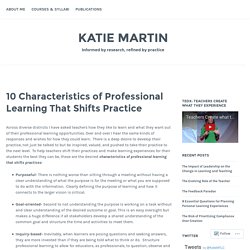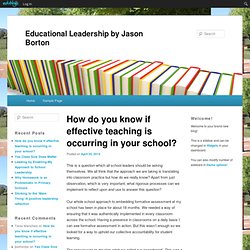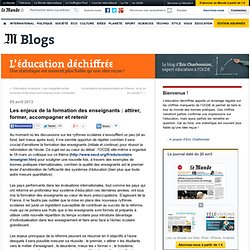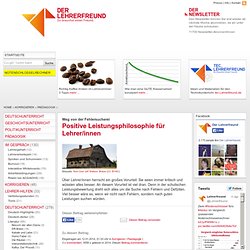

10 Characteristics of Professional Learning That Shifts Practice – Katie Martin. Across diverse districts I have asked teachers how they like to learn and what they want out of their professional learning opportunities.

Over and over I hear the same kinds of responses and wishes for how they could learn. There is a deep desire to develop their practice, not just be talked to but be inspired, valued, and pushed to take their practice to the next level. To help teachers shift their practices and make learning experiences for their students the best they can be, these are the desired characteristics of professional learning that shifts practices: Purposeful- There is nothing worse than sitting through a meeting without having a clear understanding of what the purpose is for the meeting or what you are supposed to do with the information. Clearly defining the purpose of learning and how it connects to the larger vision is critical.Goal-oriented- Second to not understanding the purpose is working on a task without and clear understanding of the desired outcome or goal.
Helen Timperley. Butler, Self-Regulation and Collaborative Learning. How do you know if effective teaching is occurring in your school? This is a question which all school leaders should be asking themselves.

We all think that the approach we are taking is translating into classroom practice but how do we really know? Apart from just observation, which is very important, what rigorous processes can we implement to reflect upon and use to answer this question? Our whole school approach to embedding formative assessment at my school has been in place for about 18 months. We needed a way of ensuring that it was authentically implemented in every classroom across the school. Having a presence in classrooms on a daily basis I can see formative assessment in action. The answer was to develop what we called our ‘scoreboard’. Once the scoreboard was agreed upon we set about implementing a system of peer observation known as Educational Walkthroughs.
A high level of trust among staff is important to ensure the authenticity and success of the Walkthrough process. Les enjeux de la formation des enseignants : attirer, former, accompagner et retenir. Au moment où les discussions sur les rythmes scolaires s’essoufflent un peu (et au fond, tant mieux après tout), il me semble opportun de répéter combien il sera crucial d’améliorer la formation des enseignants (initiale et continue) pour réussir la refondation de l’école.

Ce sujet est au cœur du débat : l’OCDE elle-même a organisé le 18 mars un colloque sur ce thème ( pour souligner une nouvelle fois, à travers des exemples de bonnes pratiques internationales, combien la qualité des enseignants est le premier levier d’amélioration de l’efficacité des systèmes d’éducation (bien plus que toute autre mesure quantitative). Les pays performants dans les évaluations internationales, tout comme les pays qui ont reformé en profondeur leur système d’éducation ces dernières années, ont tous mis la formation des enseignants au cœur de leurs préoccupations. Susciter des vocations : comment attirer les étudiants vers le métier d’enseignant Des progrès rapides sont possibles. Phillips, Powerful Learning - Creating learning communities in urban school reform.
Formation des enseignants : le doute s'installe, Aquitaine. Positive Leistungsphilosophie für Lehrer/innen. Weg von der Fehlersucherei Bildquelle: flickr-User Jeff Wallace: Broken [CC by-nc] Über Lehrer/innen herrscht ein großes Vorurteil: Sie seien immer kritisch und wüssten alles besser.

An diesem Vorurteil ist viel dran. Denn in der schulischen Leistungsbewertung dreht sich alles um die Suche nach Fehlern und Defiziten. Viel besser wäre es, wenn wir nicht nach Fehlern, sondern nach guten Leistungen suchen würden. Das Problem: Fehlerorientierung Legen Sie eine/r Deutschlehrer/in ein Bewerbungsanschreiben hin ("Könntest du das mal bitte durchschauen, ob das ok ist? "). A) "Hier oben musst du das Datum ... Oder eher b) "Schöner Einleitungssatz, das schafft Verbindlichkeit. Das gleiche gilt natürlich auch für die Wirtschaftslehrer/in, der Sie die Buchhaltungsunterlagen hinlegen oder für die Mathelehrer/in, die einen Rechenweg beurteilt. Warum Lehrer/innen immer nach Fehlern suchen a) Falsche Vorstellung von "Fördern" Als Pädagog/innen sollen Lehrer/innen fördern. Obin, Attirer, former et retenir des enseignants de qualité.